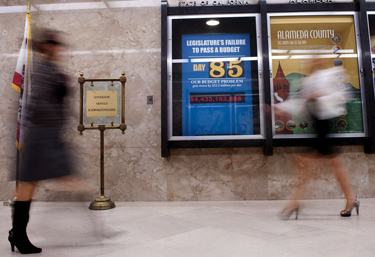
The budget clock at the entrance to Gov. Arnold Schwarzenegger's office Thursday shows that a state budget is 85 days overdue. Today will mark the record for lateness, though the governor and legislative leaders appear closer to an agreement. (Hector Amezcua/[email protected])
State leaders broke a dubious record today as California entered the 86th day of the fiscal year without enacting a budget.
Perhaps that served as sufficient motivation. Legislative leaders and Gov. Arnold Schwarzenegger announced Thursday they had agreed on a "framework" for a budget agreement that could be voted on as early as next week.
But they provided no official details on the plan they discussed at Schwarzenegger's private office in Santa Monica. And they were hesitant to call it an official compromise until after they brief lawmakers and meet again Monday in Sacramento. The state faces a projected $19 billion deficit, more than one-fifth of the general fund budget.
"The governor and legislative leaders have reached the framework of an agreement, will work through the details over the weekend, and hope to come to a final agreement when they reconvene Monday," Schwarzenegger spokesman Aaron McLear said in a statement that was reviewed by legislative leaders.
Among other issues, Democrats and Republicans discussed K-12 education funding and clarifying how schools will be compensated in future years for absorbing spending cuts in previous budgets, said sources who declined to be identified because the deal is not yet final.
Democrats initially had sought about $2 billion more for K-12 schools than Republicans wanted to spend; sources said Democrats had lowered their demand for most of the additional money.
Republicans have tentatively agreed to suspend a 2008 law making it easier for firms to use current losses to reduce their past and future tax bills, sources said. Democrats estimated the suspension would raise $1.4 billion in revenues. Republicans rejected other ideas to enact a new oil production tax and to exchange higher income and vehicle taxes for lower sales taxes.
GOP leaders have backed off proposals to eliminate welfare-to-work and child care subsidies for about 142,000 low-income children, though it's unclear how those programs may still be affected.
The governor wants higher pension contributions and unpaid leave days for state workers. He also wants the Legislature to reduce pension packages for future state employees. Democrats are willing to roll back a 1999 law that raised state workers' pensions, but they still want Schwarzenegger to negotiate any reductions with unions, according to one source.
It remains unclear how Democrats satisfied the governor's pension demand. The largest labor group, Service Employees International Union Local 1000, recently renewed talks with the governor's administration.
"Our position is that this is an agreement that needs be done through collective bargaining," said Dave Low, a union coalition lobbyist. "Anything done unilaterally will be opposed by unions."
To meet a Schwarzenegger demand, lawmakers are drafting a measure for the 2012 ballot that would force the state to save more money to build a stronger "rainy-day fund," sources said.
Leaders have agreed to assume a higher revenue projection worth about $1.4 billion. They also expect Schwarzenegger to sell 11 state major office properties to generate at least $1 billion for the budget. The state would lease the buildings back after the sale.
The budget also will assume more in federal funds beyond what leaders already expected, according to one source. Schwarzenegger projected the state would receive $3.4 billion in his May plan.
Despite the budget delay - breaking a record set in 2008 - public anger has not been sufficient to force state leaders to cut a deal. Under court decisions, the state is required to pay for most functions, and many of them operate with little apparent change.
"The thing that fascinates me most is that in just about every other state, the pressure would be so intense to have this done," said Scott D. Pattison, executive director of the National Association of State Budget Officers. "I'm just fascinated that it's not there."
Yet the budget impasse has been painful for a select group of people who rely on state payments but were ineligible to receive compensation for the last 12 weeks. Those include state contractors, child care and health care providers and low-income students. The state will have let $6.4 billion in payments lapse by the end of September, according to Controller John Chiang.
Child care centers that serve low-income families are struggling to keep their doors open. Oak Park Preschool, which serves 44 children, is surviving on donations but will have to close Oct. 8 without a state budget, said acting site supervisor Shirley Golden.
North Highlands-based Beanstalk, which provides state-subsidized care for 900 children, is relying on reserves and an emergency line of credit to stay open, said executive director Saundra Walden.
The state has stopped paying $40 million in rent each month, which has prompted some landlords to stop paying for services. In South Lake Tahoe, the utility firm NV Energy was days away from shutting off power at the Lahontan Regional Water Quality Control Board office until its landlord agreed this week to pay for past bills, said supervising engineer Chuck Curtis.











